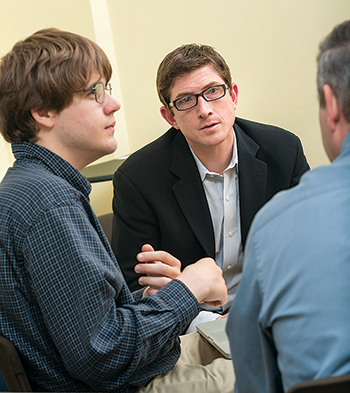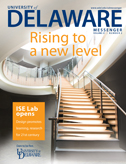Studies examine possible causes, effects of autism disorders

RESEARCH | With the alarming increase in recent years of autism spectrum disorders (ASD), researchers are working across many disciplines in search of a better understanding of the condition that is now estimated to affect about one in 88 American children.
At UD, an engineer is proposing a new way to investigate the possible link between ASD and gastrointestinal symptoms, while another recent study delves into the effects that the neuro-developmental disorder has on families.
Prasad Dhurjati, professor of chemical and biomolecular engineering, says that autism has been cited as being linked to gastrointestinal symptoms but that researchers often study the digestive bacteria and other potential causes of autism separately. He wondered if a systems biology approach—focusing on how the parts connect to the whole system—could be used to model the connectivity of key contributors to the development of ASD.
He is working to map out these connections with Myron Sasser, a former UD professor of plant pathology, who studied microbes that cause diseases in plants. Their model proposes a circular relationship between digestive system bacteria, oxidative stress and intestinal permeability.
While it is certain that these aren’t the only connections to be made, Dhurjati says, a multifaceted approach and combination treatment to address all factors at once may produce better results and minimize interrelated effects.
“There are many unanswered questions; we are simply raising questions of connectivity from the systems level in hopes of inspiring others to rethink their approach and continue to study this problem from different vantage points,” he says.
In another study conducted by a UD researcher, Brian Freedman of the University’s Center for Disabilities Studies explored how the challenges of caring, and finding help, for a child with ASD causes family stress.
Working with a team of researchers from Kennedy Krieger Institute and Johns Hopkins University, Freedman first conducted a study examining divorce rates among parents of children with ASD. Despite a common belief that the rates were higher than average, he says, “We did not observe a difference between the divorce rates of parents of children with ASD and other parents. We also discovered that an increased severity of the autism did not correlate to more marital strife.”
That does not mean there is no additional stress, he says. A second element of Freedman’s research, conducted in collaboration with colleagues at Loyola University Maryland, examined the relationship of siblings. This study found that siblings of children with ASD reported more challenges in their sibling relationship compared with siblings of children with Down syndrome.
Another source of family stress occurs when children with ASD may exhibit mental health challenges, such as anxiety and aggression. Freedman and his colleagues at Kennedy Krieger and Johns Hopkins found that children with ASD are nine times more likely than other children to visit an emergency room for psychiatric reasons.
“Limited access to outpatient mental health services often leads children with ASD to seek treatment in the emergency room,” Freedman says. “Due to the limited availability of knowledgeable providers and a lack of insurance coverage for behavioral health services, these issues may go untreated until they become a major health and safety concern for the family.”
Freedman has used the results of this research to develop interventions designed to increase family members’ overall quality of life and decrease their stress.






